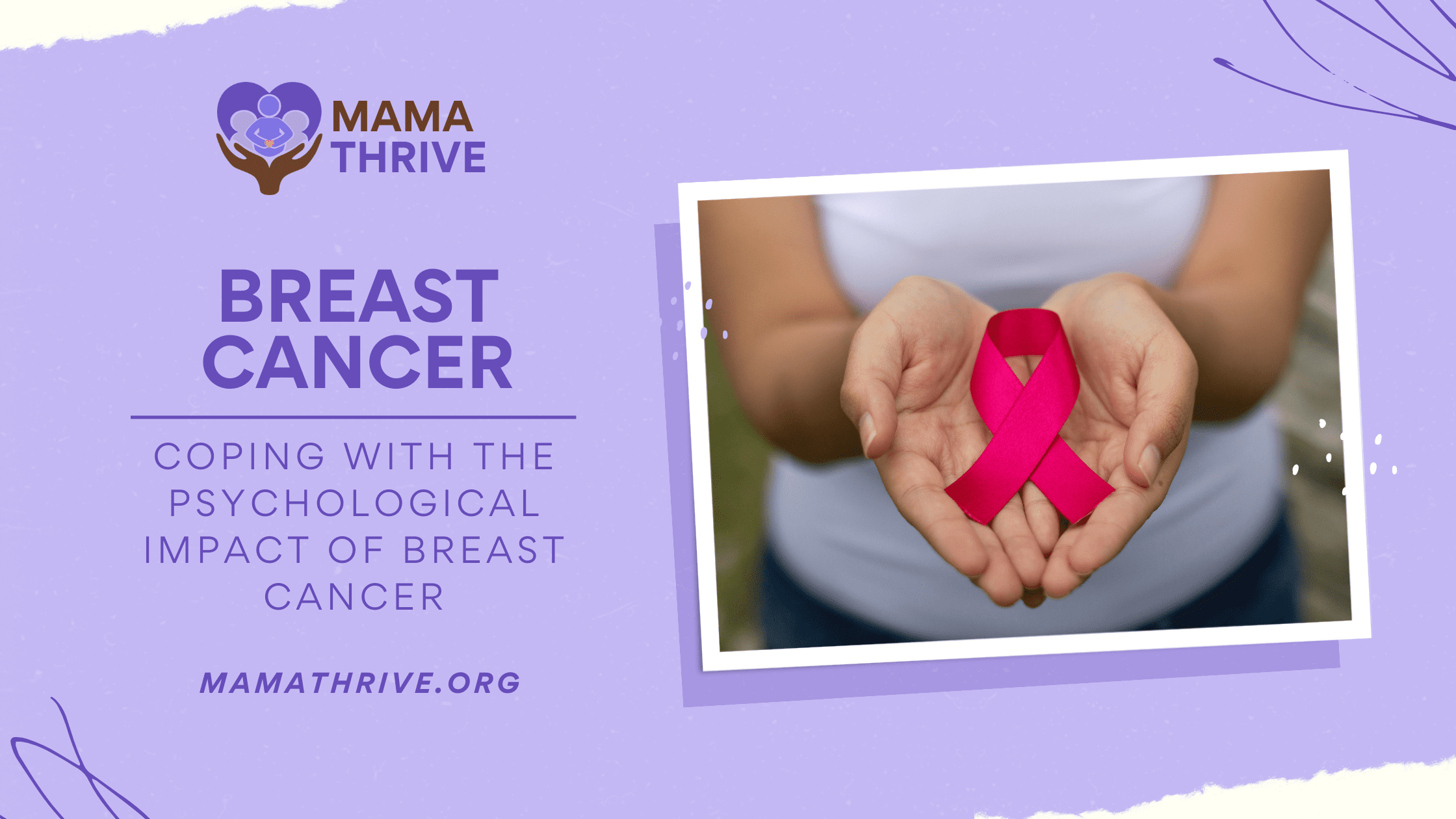Receiving a breast cancer diagnosis is a life-altering event that can send shockwaves through one’s life, inducing profound psychological effects not just on the individual diagnosed but also on their loved ones. Navigating the emotional and mental challenges that frequently accompany breast cancer is an imperative aspect of the journey towards recovery.
According to the World Health Organization (WHO), breast cancer is the most common cancer among women worldwide, with approximately 2.3 million new cases diagnosed each year. In the United States alone, the American Cancer Society (ACS) reports that over 280,000 new cases of invasive breast cancer are expected in women in 2023. These statistics underscore the urgent need for effective coping strategies to address the psychological impact of this prevalent and challenging disease.
In this blog, we will delve into the psychological impact of breast cancer and, more importantly, offer you effective solutions to cope with these formidable challenges.
Understanding the Psychological Impact of Breast Cancer
Breast cancer is a complex adversary, one that not only challenges the body but also poses significant psychological hurdles. The psychological impact of breast cancer is a multifaceted journey that varies widely from person to person and evolves through the different stages of diagnosis, treatment, and survivorship. To truly grasp the scope of this impact, it’s vital to explore some of the key psychological challenges that individuals facing breast cancer encounter:
Anxiety and Fear
The most common psychological impact of breast cancer is anxiety and fear. Imagine being handed a diagnosis that could potentially change the course of your life. For many, a breast cancer diagnosis triggers intense anxiety and fear. The uncertainty surrounding the disease, concerns about treatment, and the haunting possibility of recurrence cast a long shadow over the minds of those affected. This emotional turbulence can become overwhelming and persistent, disrupting daily life and decision-making.
Example: A vibrant and active woman in her 40s, was diagnosed with breast cancer. The overwhelming fear of not seeing her children grow up and the anxiety about the treatment’s side effects made her nights sleepless and her days a constant battle with apprehension.
Depression

Feelings of sadness, hopelessness, and depression are common companions on the breast cancer journey. Coping with the physical symptoms, the emotional toll of treatment side effects, and the constant uncertainty about the future can weigh heavily on one’s mental well-being. Depression can manifest as a pervasive sense of despair and a loss of interest in activities that once brought joy.
Example: A breast cancer survivor often found himself struggling to muster the energy to engage in activities he once cherished. The persistent fatigue and emotional lows took a toll on his overall quality of life.
Body Image and Self-Esteem
Another psychological impact of breast cancer is a person’s declining body image and self-esteem. Breast cancer treatments frequently involve surgery, which can lead to changes in a woman’s body image and self-esteem. The loss of a breast or the alteration of one’s appearance can have a profound impact on how individuals perceive themselves. This transformation can create challenges in adjusting to the “new normal” post-treatment.
Example: A woman underwent a mastectomy as part of her breast cancer treatment. While grateful for her recovery, she grappled with feelings of self-consciousness and a sense of loss regarding her body’s appearance.
Social Isolation
The physical and emotional toll of breast cancer can sometimes lead to social isolation. Patients may withdraw from social activities and relationships, feeling burdened by their struggles and overwhelmed by the need to put on a brave face. This isolation can lead to profound feelings of loneliness.
Example: A woman diagnosed with breast cancer gradually distanced herself from her friends and family. She felt disconnected from her support system, which exacerbated her sense of loneliness during an already challenging time.
Post-Traumatic Stress Disorder (PTSD)

While often associated with combat veterans, PTSD can affect individuals who have experienced traumatic events, including a breast cancer diagnosis and treatment. Some individuals may experience symptoms such as flashbacks, nightmares, and hypervigilance, all of which can contribute to severe emotional distress.
Example: A male breast cancer survivor found himself plagued by vivid nightmares about his diagnosis and treatment. These experiences left him feeling on edge and constantly reliving the trauma.
Understanding the breadth and depth of these psychological challenges is the first step toward addressing them effectively. In the sections that follow, we will explore solutions and coping strategies to help individuals and their loved ones navigate the psychological impact of breast cancer with resilience and hope.
Coping Strategies
Facing the psychological impact of breast cancer is an arduous journey, but it is not one that you have to navigate alone. With the right strategies and support, individuals can build resilience and find hope even in the face of immense challenges. Let’s explore in-depth some of the coping strategies that can help individuals cope with the psychological effects of breast cancer:
Seek Professional Help
One of the most crucial steps in managing the psychological impact of breast cancer is seeking professional assistance. Mental health professionals specializing in cancer-related issues can provide invaluable support. Therapists and counselors can offer a safe space to express feelings, fears, and anxieties. They also provide coping strategies tailored to individual needs.
Example: A woman diagnosed with breast cancer found solace in regular sessions with an oncology therapist. These sessions helped her process her emotions and develop effective strategies for managing anxiety and depression.
Stay Informed
Knowledge empowers individuals to make informed decisions about their health. Staying informed about your breast cancer diagnosis, treatment options, and prognosis is essential. Trustworthy sources like the World Health Organization (WHO) offer a wealth of information about breast cancer, its treatments, and the latest research developments.
Example: Upon receiving his diagnosis, a man delved into educational materials from WHO to better understand his treatment options. This knowledge gave him a sense of control and a foundation for discussions with his medical team.
Build a Support Network

Friends and family can be an invaluable source of emotional support. Lean on them during your breast cancer journey. The American Cancer Society (ACS) provides resources and guidance on how to build a strong support network. Loved ones can offer comfort, companionship, and practical assistance during treatment.
Example: A young woman’s close-knit family rallied around her when she was diagnosed with breast cancer. Their unwavering support, from accompanying her to appointments to simply being there to listen, made a significant difference in her emotional well-being.
Self-Care
Prioritizing self-care is fundamental for both physical and emotional well-being. Engage in activities that promote self-nurturing, such as regular exercise, maintaining a balanced diet, and practicing mindfulness techniques and relaxation exercises.
Example: A male breast cancer survivor, incorporated daily walks and meditation into his routine. These practices not only boosted his physical health but also provided mental clarity and emotional balance.
Join Support Groups
Connecting with others who are going through similar experiences can be incredibly comforting. Look for local or online breast cancer support groups where you can share your feelings and insights, gain practical advice, and build a sense of camaraderie.
Example: A young woman found immense comfort in an online breast cancer support group where she connected with individuals who understood the unique challenges she was facing. Their shared experiences created a sense of community and empowerment.
Express Yourself
Don’t hesitate to express your feelings and concerns to your healthcare team. They are not only there to treat your physical condition but also to provide guidance and potentially refer you to additional resources that can address your emotional needs.
Example: A man in his 30s openly discussed his fears and concerns with his oncologist, who connected him with a psychologist specializing in cancer care. This collaborative approach helped James manage his anxiety effectively.
Mindfulness and Meditation

Mindfulness techniques and meditation can be powerful tools for managing stress and anxiety. Incorporating these practices into your daily routine can promote emotional well-being and help you stay centered during challenging times.
Example: A woman in her 50s practiced mindfulness meditation to alleviate the anxiety that often accompanied her chemotherapy sessions. This practice allowed her to stay present in the moment and reduce treatment-related stress.
Set Realistic Goals
Breaking down your breast cancer journey into manageable steps and setting realistic goals can provide a sense of accomplishment and motivation. Celebrate small victories along the way to maintain a positive outlook.
Example: A guy set small milestones for himself, such as completing each round of treatment or hitting a specific fitness goal. Celebrating these achievements gave him a sense of control and hope throughout his journey.
By implementing these coping strategies and seeking the support you need, you can navigate the psychological impact of breast cancer with resilience and determination. Remember, you are not alone in this journey, and there is hope for emotional healing and growth.





